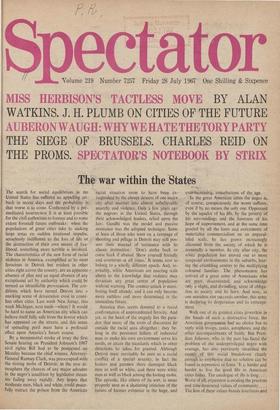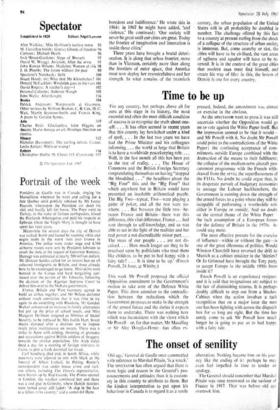The search for social equilibrium in the United States has
suffered an appalling set- back in recent days and the probability is that worse is to come. Confronted by a pre- meditated insurrection it is at least possible for the civil authorities to foresee and_to some extent forestall future outbreaks: when the populations of great- cities take to sacking large areas on sudden irrational impulse, senselessly indifferent to the loss of life or the destruction of their own means of live- lihood, something more terrible is involved. The characteristics of the new form of racial violence in America, exemplified at 'its most ferocious in Detroit but evident in other cities right across the country, arc an apparent absence of plan and an equal absence of any exceptional act by authority which could be termed an identifiable provocation. The con- ditions which have turned Detroit into a smoking scene of devastation exist in count- less other cities. Last week New Jersey, this week Michigan, next week—where? It would be hard to name an American city which can believe itself fully safe from the horror which has appeared on the streets, and, this sense of spreading peril must have a profound effect upon America's future course.
By a monumental stroke of irony the first Senate hearing on President Johnson's 1967 civil rights Bill had to be postponed on Monday because the chief witness, Attorney- General Ramsey Clark, was preoccupied with the rioting mobs of Detroit; in the new at- mosphere the chances of any major advance in the negro's condition by legislative means are fading away rapidly. Any hopes that moderate men, black and white, could peace- fully extract the poison from the American racial situation seem to have been ex- tinguished by the abrupt descent of one major city after another into almost unbelievable anarchy and violence. Only a few years ago the negroes in the United States, through their acknowledged leaders, relied upon the law; Gandhi was the model and passive resistance was the adopted technique. Some at least of those who went on a rampage of shooting and pillage in Detroit may still pos.; sess their manual of 'resistance with its classic instruction: 'Don't strike back or curse back if abuSed. Show yourself friendly and courteous at all times; It seems now to belong to a wholly different epoch. And, in- evitably, white Americans are reacting with alarm to the knowledge that violence may devastate any great centre of population without warning. The counter-attack is mani- festing itself already, and it can only become more ruthless and more determined in the immediate future.
America thus seems doomed to a racial confrontation of unprecedented ferocity. And yet, at the heart of the tragedy lies the para, dox that many of the roots of discontent lie outside the racial area altogether: they be. long in the persistent failure of industrial man to_make his own environment serve his needs, or attain the standards which in other directions he takes for granted. Although. Detroit must inevitably be seen as a racial conflict of a special severity, in fact the looters and gunmen there damaged black men as well as white, and there were white men as well as black among the looting mobs. The episode, like others of its sort, is more properly seen as a shattering criticism of the nature of human existence in the huge, and . In the great American cities the negro is. of course, conspicuously the worst •sufferer, even if by no means the only one. Oppressed by the squalor of his life; by the poverty of his surroundings and the faintness of his hope of improvement, and at the same time goaded by all the lures and enticements of materialist commercialism on an unparal- • leled scale, he has grown increasingly. alienated from the society of which he is nominally a member. In city after city, the white population has moved out to more congenial environments in the suburbs, leav- ing the crumbling centres to ,the multiplying coloured families. The phenomenon has arrived of a great army of Americans who arc poor, 'discontented, and • acknowledge only a slight, and dwindling, sense of obliga- tion to society and its laws. And now, as one senseless riot succeeds another, this army is declaring its desperation and its estrange- ment. boredom and indifference.' He wrote this in 1964: in 1967 he might have added, 'and violence.' He continued: 'Our society will never be great until our cities are great. Today the frontier of imagination and innovation is inside those cities: Three years have brought a brutal deteri- oration. It is along that urban frontier, more than in Vietnam, certainly more 'than along the frontiers of outer space, that America must now deploy her resourcefulness and her strength. In what remains of the twentieth century, the urban population of the United States will in all probability be doubled in number. The challenge offered by this fact to a country at present reeling from the shock of a collapse of the structure of urban society is immense. But, come anarchy or riot, the cities will have to be civilised, the vast areas of ugliness and squalor will have to be re- newed. It is in the context of the great cities that moddrn man must find himself, and create his way of life: in this, the les'son of Detroit is one for every country.































